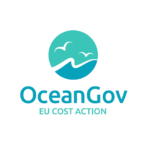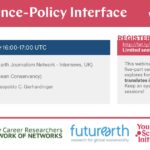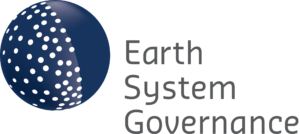
These webinars, created by early careers for early careers, will aim at improving our understanding of interactions between science and policy, give recommendations on how to best communicate science to policy makers, and learn from the experience of senior researchers and professionals.
Register here for the webinars
How can scientific knowledge be effectively translated into concrete policies? Why is there such a large gap between science and policy, despite continuous bridging efforts? And how can this gap be addressed?
Such questions are central when discussing the struggles in the science-policy interface. The question of how to advise policy-making effectively to incorporate the insights gained from research is fundamental for scientists and academics. Often, the standard approach of the latter is to accumulate evidence and deliver insights from research at the footsteps of policy-making via policy briefs or reports, in the hope that they can be turned into policies. This approach is often short-sighted and routinely breaks down: the complex processes of policy-making, institutional and personal interests, incentive structures and power imbalances need to be considered. All of them influence policy formulations, or prevent them from happening. Only if these processes can be properly understood, impactful research agendas can be produced.
The Early Career Researchers Network of Networks (ECR NoN) and Future Earth are organizing a series of five webinar sessions, from mid-September to mid-October, to better understand the science-policy interface. Guest speakers from both the research and the policy sectors, working on all levels of science-policy – from local to global – and will share their experiences on the translation of scientific knowledge into concrete policies. They will thematize what brought them into their current line of work, how the common conception of their job is different from the reality, what the inherent logic and pressures of the specific context of their line of work is and what concrete advice they can give to early career professionals on effectively translating scientific knowledge into concrete policies.
Each session will include an interactive part in which the audience will be given the opportunity to actively participate in the discussion by posing questions to the guest speakers.
Since this series is mainly organised by early careers for early careers, one of the core purposes of the webinars will be to inform the next generation researchers about the difficulties in the science-policy interface and to offer ways of effectively dealing with its struggles. However, the series will be open to professionals at all career stages interested in the topic. The webinar sessions are scheduled as follows:
Urban KAN Session on 18th September 2018 at 14:00-15:00
(Coordinated Universal Time, UTC)
Speakers:
Jose A Puppim De Oliveira (faculty member at the Getulio Vargas Foundation (FGV/EAESP and FGV/EBAPE), Fudan University (Shanghai) and Universidad Andina Simon Bolivar (Quito))
Seth Schultz (Advisor on Science and Innovation to the Global Covenant of Mayors)
Moderated by: Gaby Langendijk (ECR NoN)
Oceans KAN Session on the 25th of September 2018 at 16:00-17:00 (Coordinated Universal Time, UTC)
Speakers:
Mona Samari (Earth Journalism Network – Internews, UK)
Anna Zivian (Ocean Conservancy, USA)
Moderated by: Leopoldo C. Gerhardinger (ECR NoN)
Water-Energy-Food Nexus Session on 2nd of October 2018 at 14:00-15:00 (Coordinated Universal Time, UTC)
Speakers:
Aditi Mukherji (International Centre for Integrated Mountain Development ICIMOD)
Pamela Katic (Natural Resources Institute, University of Greenwich)
Moderated by: Felipe B. Tavares (ECR NoN)
Session on the 9th of October 2018 – To Be Confirmed
Natural Assets KAN on the 16th of October 2018 – Time to be confirmed
Speakers:
Marten Winter (Head of sDiv – Synthesis Centre of German Centre for Integrative Biodiversity Research iDiv)
Xavier Le Roux (Senior Scientist at French National Institute for Agricultural Research INRA; CEO and coordinator of BiodivERsA)
Moderated by: Hannah Moersberger (Future Earth)



Recent Comments